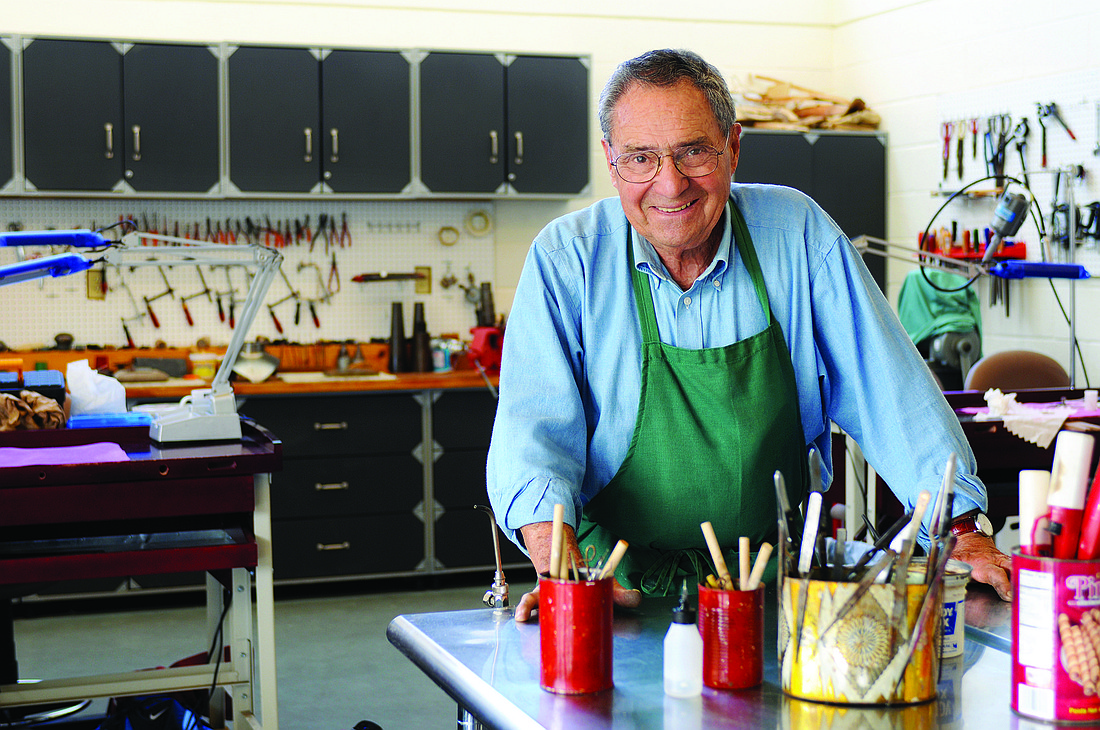- April 25, 2024
-
-
Loading

Loading

Ed Brickman seemed ageless to many who knew him.
“He was one of those guys who, you never really knew his age,” said his friend, David Brenner. “He was older than you thought, but he didn’t act like it.”
His two passions (beyond his family and friends) remained unchanged as he aged: jewelry-making and tennis. He never missed a game of tennis and went to the Longboat Key Center for the Arts, a Division of Ringling College, every Tuesday to share his craft with friends and students.
As an artist, he only improved with age.
“His work seemed to grow only more prolific and beautiful during a recent illness,” said Jane Buckman, executive director of the Arts Center.
“The only time he could be 100% of who he was was by being in that creative zone. It overrode any of the pain,” she said.
Brickman died Sept. 5. He was 89.
In October, he will be honored with the Arts Center’s “Ageless Creativity Award” — the first individual to receive the award posthumously. Ageless Creativity honorees “affirm how the pursuit of the creative process transcends time, engages both our physical and mental agility, and provides resolution to an ever-evolving search for identity through imagination and courage, according to the Arts Center’s website, ringling.edu.
Brickman was widely known on the Key for the classes he taught at the Arts Center, although his work earned him a national audience. His work can be found in the permanent collection of the Newark Museum, in Newark, N.J., and the Museum of Art and Design in New York City.
But the renowned teacher was a self-taught man in many facets of his life.
Born May 7, 1925, in New York City, he dropped out of high school in ninth grade to support his mother. He became a dental technician and also began making jewelry when he was 16. At the time, he took apart his mother’s stove to use the light to make a solder.
Brickman served in the U.S. Army during World War II in the Philippines.
He worked for a professional jeweler for a period in 1952, but instead, opted to start a business, Uneeda Bolt & Screw Inc., which imports and distributes nuts, bolts and screws, in 1954 with a loan from his grandfather. His son, Eli Brickman, owns and operates the business today. The elder Brickman built his business into a global operation by working six or seven days a week, according to his daughter, Carol Diamant.
“He didn’t even have a high school diploma, but he was one of the smartest people you would ever meet,” said Diamant, who said her father had a thirst for knowledge.
He said his business had nothing to do with his jewelry — it was a way to provide for his family. Still, the bolts, screws and brass washers sometimes inspired his jewelry. He would take a brass washer, flatten it, shine it, buff it and use it for a necklace.
Brickman first visited the Key approximately 35 years ago, when he decided to take a short vacation after a health scare. A friend recommended Longboat Key due to Brickman’s love of tennis. He and his late wife, Alice, became snowbirds before making the island their home.
Even in retirement, Brickman continued to learn.
He took tennis lessons even into his 80s, determined not to fall into a rut on the courts.
“For a guy his age who was short in stature, he played quite a game of tennis,” said Larry Straff, who was part of the same tennis group. “He had great court sense and hit the ball with a lot of force.”
Brickman had other lesser known talents, including bonsai and cooking Chinese dishes from scratch.
Brickman was known as a philanthropist, as well as a teacher. He donated $500,000 in 2010 to provide five Alice and Ed Brickman scholarships for Ringling students. The dedication ceremony took place in Ringling’s Brickman Café.
Brenner noticed the cafeteria’s name during a visit to Ringling and asked his friend about it.
“He said, ‘Yeah, one day, they mentioned the students needed a place to eat,’” Brenner said. “He probably gave a heck of a lot more than any of us noticed.”
Diamant said her father never forgot where he came from, which inspired his philanthropy. He often pointed out that other people work hard, yet never become wealthy.
“He felt he was lucky,” she said, “but in a sense, I feel like he made his luck.”
Brickman is survived by his daughter, Carol Diamant; sons Alan, Eli and Jesse; and five grandchildren.
The Arts Center will honor Brickman from 5:30 to 7:30 p.m. Oct. 10, during its Ageless Creativity Visual Arts reception and awards ceremony. A celebration of life will take place from 2 to 4 p.m. Oct. 11, at the Arts Center.